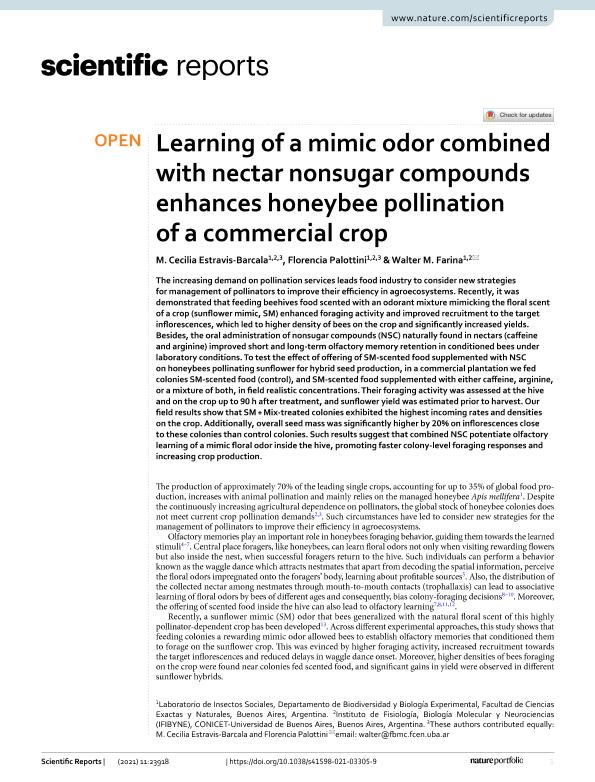Mostrar el registro sencillo del ítem
dc.contributor.author
Estravis Barcala, Maria Cecilia

dc.contributor.author
Palottini, Florencia

dc.contributor.author
Farina, Walter Marcelo

dc.date.available
2022-10-28T10:48:07Z
dc.date.issued
2021-12
dc.identifier.citation
Estravis Barcala, Maria Cecilia; Palottini, Florencia; Farina, Walter Marcelo; Learning of a mimic odor combined with nectar nonsugar compounds enhances honeybee pollination of a commercial crop; Nature; Scientific Reports; 11; 1; 12-2021; 1-8
dc.identifier.issn
2045-2322
dc.identifier.uri
http://hdl.handle.net/11336/175291
dc.description.abstract
The increasing demand on pollination services leads food industry to consider new strategies for management of pollinators to improve their efficiency in agroecosystems. Recently, it was demonstrated that feeding beehives food scented with an odorant mixture mimicking the floral scent of a crop (sunflower mimic, SM) enhanced foraging activity and improved recruitment to the target inflorescences, which led to higher density of bees on the crop and significantly increased yields. Besides, the oral administration of nonsugar compounds (NSC) naturally found in nectars (caffeine and arginine) improved short and long-term olfactory memory retention in conditioned bees under laboratory conditions. To test the effect of offering of SM-scented food supplemented with NSC on honeybees pollinating sunflower for hybrid seed production, in a commercial plantation we fed colonies SM-scented food (control), and SM-scented food supplemented with either caffeine, arginine, or a mixture of both, in field realistic concentrations. Their foraging activity was assessed at the hive and on the crop up to 90 h after treatment, and sunflower yield was estimated prior to harvest. Our field results show that SM + Mix-treated colonies exhibited the highest incoming rates and densities on the crop. Additionally, overall seed mass was significantly higher by 20% on inflorescences close to these colonies than control colonies. Such results suggest that combined NSC potentiate olfactory learning of a mimic floral odor inside the hive, promoting faster colony-level foraging responses and increasing crop production.
dc.format
application/pdf
dc.language.iso
eng
dc.publisher
Nature

dc.rights
info:eu-repo/semantics/openAccess
dc.rights.uri
https://creativecommons.org/licenses/by/2.5/ar/
dc.subject
honeybee
dc.subject
pollination
dc.subject
learning
dc.subject
sunflower
dc.subject.classification
Ecología

dc.subject.classification
Ciencias Biológicas

dc.subject.classification
CIENCIAS NATURALES Y EXACTAS

dc.title
Learning of a mimic odor combined with nectar nonsugar compounds enhances honeybee pollination of a commercial crop
dc.type
info:eu-repo/semantics/article
dc.type
info:ar-repo/semantics/artículo
dc.type
info:eu-repo/semantics/publishedVersion
dc.date.updated
2022-09-23T14:24:06Z
dc.journal.volume
11
dc.journal.number
1
dc.journal.pagination
1-8
dc.journal.pais
Reino Unido

dc.journal.ciudad
Londres
dc.description.fil
Fil: Estravis Barcala, Maria Cecilia. Consejo Nacional de Investigaciones Científicas y Técnicas. Oficina de Coordinación Administrativa Ciudad Universitaria. Instituto de Fisiología, Biología Molecular y Neurociencias. Universidad de Buenos Aires. Facultad de Ciencias Exactas y Naturales. Instituto de Fisiología, Biología Molecular y Neurociencias; Argentina
dc.description.fil
Fil: Palottini, Florencia. Consejo Nacional de Investigaciones Científicas y Técnicas. Oficina de Coordinación Administrativa Ciudad Universitaria. Instituto de Fisiología, Biología Molecular y Neurociencias. Universidad de Buenos Aires. Facultad de Ciencias Exactas y Naturales. Instituto de Fisiología, Biología Molecular y Neurociencias; Argentina
dc.description.fil
Fil: Farina, Walter Marcelo. Consejo Nacional de Investigaciones Científicas y Técnicas. Oficina de Coordinación Administrativa Ciudad Universitaria. Instituto de Fisiología, Biología Molecular y Neurociencias. Universidad de Buenos Aires. Facultad de Ciencias Exactas y Naturales. Instituto de Fisiología, Biología Molecular y Neurociencias; Argentina
dc.journal.title
Scientific Reports
dc.relation.alternativeid
info:eu-repo/semantics/altIdentifier/doi/http://dx.doi.org/10.1038/s41598-021-03305-9
Archivos asociados
